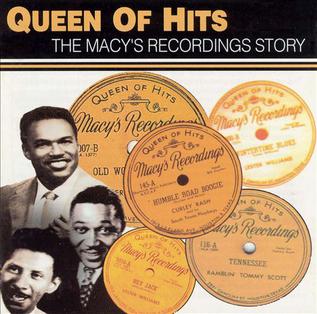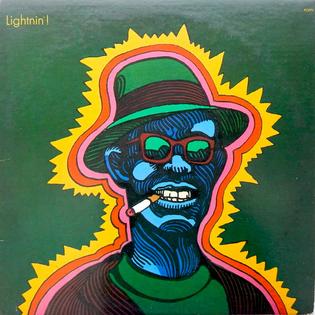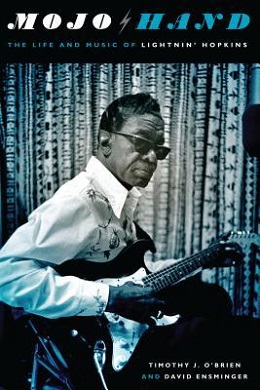Related Research Articles

Samuel John "Lightnin'" Hopkins was an American country blues singer, songwriter, guitarist and occasional pianist from Centerville, Texas. In 2010, Rolling Stone magazine ranked him No. 71 on its list of the 100 greatest guitarists of all time.

Les Blank was an American documentary filmmaker best known for his portraits of American traditional musicians.

J. B. Lenoir was an American blues guitarist and singer-songwriter, active in the Chicago blues scene in the 1950s and 1960s.
Danny Thomas was the drummer for the 13th Floor Elevators from 1967 to 1969, replacing John Ike Walton. Danny played drums and sang backup vocals on the band's final two studio albums, Easter Everywhere and Bull of the Woods. In an interview in 2001, when asked why he had quit the band, his reply was "I never quit".

Alger "Texas" Alexander was an American blues singer from Jewett, Texas. Some sources claim that he was the cousin of Lightnin' Hopkins, but no direct kinship has been established. It has also been asserted that he was the uncle of the Texas country blues guitarist Frankie Lee Sims.
"Season of the Witch" is a song by Scottish singer-songwriter Donovan released in August 1966 on his third studio album, Sunshine Superman. The song is credited to Donovan, although sometime collaborator Shawn Phillips has also claimed authorship. Because of a dispute with Donovan's record company, a UK edition with the song was not released until June 1967.
Leonard Gaskin was an American jazz bassist born in New York City.

Blues to the Bone is the twenty-seventh studio album by Etta James. The album contains a selection of twelve blues standards which are among her favourites. James and her sons Donto and Sametto James produced the album with Josh Sklair, which reached number four in the Billboard Top Blues chart.
Luke "Long Gone" Miles was an American Texas blues and electric blues singer and songwriter. He was a protégé of Lightnin' Hopkins and variously recorded or performed with Hopkins, Sonny Terry, Brownie McGhee and Willie Chambers. Miles is best known for his 1964 album Country Born, issued by World Pacific Records.

Texas Johnny Brown, born John Riley Brown was an American blues guitarist, songwriter and singer, best known for his composition "Two Steps from the Blues". In a lengthy career, he worked with Joe Hinton, Amos Milburn, Ruth Brown, Bobby Bland, Lavelle White, Buddy Ace and Junior Parker. He was born in Mississippi, but his long association with Houston, Texas, gave him his stage name.

Macy's Recordings (Queen of Hits) was a Houston-based record label that released recordings of popular musicians around the southern United States. In April 1949, they famously recorded Lester Williams' song "Winter Time Blues" on their R&B series which became a hit. They would go on to record country and Cajun music as well.
James Edward Bond Jr., known as Jimmy Bond, was an American double bass player, arranger and composer who performed and recorded with many leading jazz, blues, folk and rock musicians between the 1950s and 1980s.
Sugar Hill, also known as Sugar Hill: Home of the Blues was a blues and jazz club in San Francisco's Broadway in the North Beach district of San Francisco, California. It was established by Barbara Dane, in May 1961, with the idea of creating a venue for the blues in a tourist district where a wider audience could hear it. There Dane performed regularly with her two most constant musical companions: Kenny "Good News" Whitson on piano and cornet and Wellman Braud, former Ellington bassist. Among her guest artists were Jimmy Rushing, Mose Allison, Mama Yancey, Tampa Red, Lonnie Johnson, Big Mama Thornton, Lightnin' Hopkins, T-Bone Walker, Brownie McGhee and Sonny Terry.
The Texas Freeman was a newspaper for African Americans established in 1893 in Houston, Texas. It was established by Charles N. Love along with his wife Lilla as well as Jack Tibbitto, and Emmett J. Scott who became its editor. It was the city's first African American newspaper. On January 3, 1931, the paper merged with the Houston Informer to become the Houston Informer and Texas Freeman.
Charles Norton Love was a pioneering newspaper publisher and civil rights activist in Houston, Texas. Love became a leading civil rights activist and advocate for the African American community. The Love's paper, the Texas Freeman criticized Jim Crow laws, sought equal pay for African American teachers, advocated for Houston's Carnegie Library for African Americans, pushed for the hiring of African American postal workers, and opposed segregation. He was active in the Republican Party and was a member of the Black-and-tan faction, then the lily white faction, and eventually sued to end the prohibition on African Americans voting in primaries held by the Democratic Party. He steadfastly sought out political representation and other opportunities for African Americans.

Lightnin'! is an album by the blues musician Lightnin' Hopkins recorded in California in 1969 and released on the Poppy label as a double LP.

Jeffrey M. Carp was an American blues harmonica player. He was best known for his work with Muddy Waters, John Lee Hooker, and Howlin' Wolf. He played harmonica on numerous charting blues albums. He was also for a period of time, a side man in Earl Hooker's band.

Mojo Hand: The Life and Music of Lightnin' Hopkins is a 2013 book by Timothy J. O'Brien and David Ensminger about Lightnin' Hopkins, published by the University of Texas Press.
Billy Bizor was an American Texas blues harmonicist, singer and songwriter. He was musically associated with his cousin Lightnin' Hopkins, on some of whose 1960s albums Bizor played harmonica and sang backing vocals. Bizor's only solo recordings took place in 1968 and 1969, but these were not released until 1989.
"Too Many Drivers" is a blues song recorded by Big Bill Broonzy in 1939. It is performed in an acoustic ensemble-style of early Chicago blues and the lyrics use double entendre often found in hokum-style blues songs. The song has been identified as one of Broonzy's more popular tunes and has been recorded over the years by a variety of artists, who often who use alternate titles, such as "Little Car Blues", "Little Side Car", "Automobile Blues", and "Let Me Ride Your Little Automobile".
References
- 1 2 3 Alan Govenar, "Mojo Hand: An Orphic Tale", in Lightnin' Hopkins: His Life and Blues, Chicago Review Press, 2010, p. 156.
- 1 2 "J.J. Phillips Family Papers, 1900-2001", Emory Libraries.
- ↑ Margaret Busby, "J. J. Phillips", Daughters of Africa , Ballantine Books, 1994, p. 667.
- ↑ Govenar, 2010, pp. 156–157.
- ↑ Govenar, 2010, p. 157.
- 1 2 3 Govenar, 2010, p. 159.
- 1 2 James A. Snead, "Mojo Hand: An Orphic Tale by J. J. Phillips" (review), Los Angeles Times, April 20, 1986.
- ↑ Lucy Scholes, "Re-Covered: A Black Female Beat Novel from the Sixties", The Paris Review , April 23, 2020.
- ↑ Stephanie Bastek, "Neglected Books Revisited, Part 2", The American Scholar , July 20, 2015.
- ↑ Alan Govenar, "Mojo Hand:An Orphic Tale", chapter 7 in Lightnin' Hopkins: His Life and Blues, Chicago Review Press, 2010, pp. 155–172.
- ↑ J. J. Phillips, "Nigga in the Woodpile", letter to the Jim Crow Museum, April 8, 2008, Ferris State University.
- ↑ Stephen J. Gertz, "Novelist Richard Brautigan's Brains At Bancroft Library: A Grand Guignol Adventure!", Booktryst, June 20, 2012.
- ↑ "Nigga in the Woodpile". March 7, 2013. Archived from the original on March 7, 2013. Retrieved April 22, 2021.
- ↑ "Nigga in the Woodpile - 2008 - Letters to the Jim Crow Museum - Jim Crow Museum - Ferris State University". www.ferris.edu. Retrieved April 22, 2021.
- ↑ "Exquisite Corpse - Journal of Letters and Life - FROM THENETHERWORLD Special to the Corpse from JJ Phillips". www.corpse.org. Retrieved April 22, 2021.
- ↑ "Exquisite Corpse - Journal of Letters and Life - LINES GLEANED FROM THE ŠÀ.ZI.GA". www.corpse.org. Retrieved April 22, 2021.
- ↑ "Exquisite Corpse - Journal of Letters and Life - Three Poems to the Eternal Beloved by J.J. Phillips". www.corpse.org. Retrieved April 22, 2021.
- ↑ "Exquisite Corpse - Journal of Letters and Life - Throat Song And Notes". www.corpse.org. Retrieved April 22, 2021.